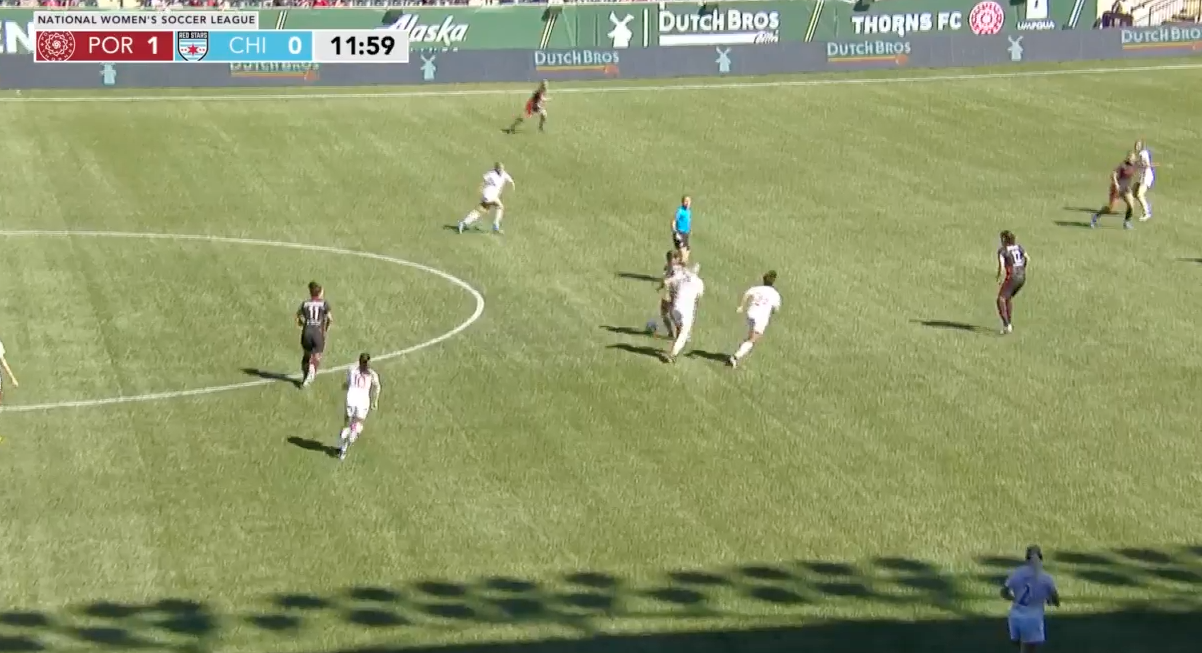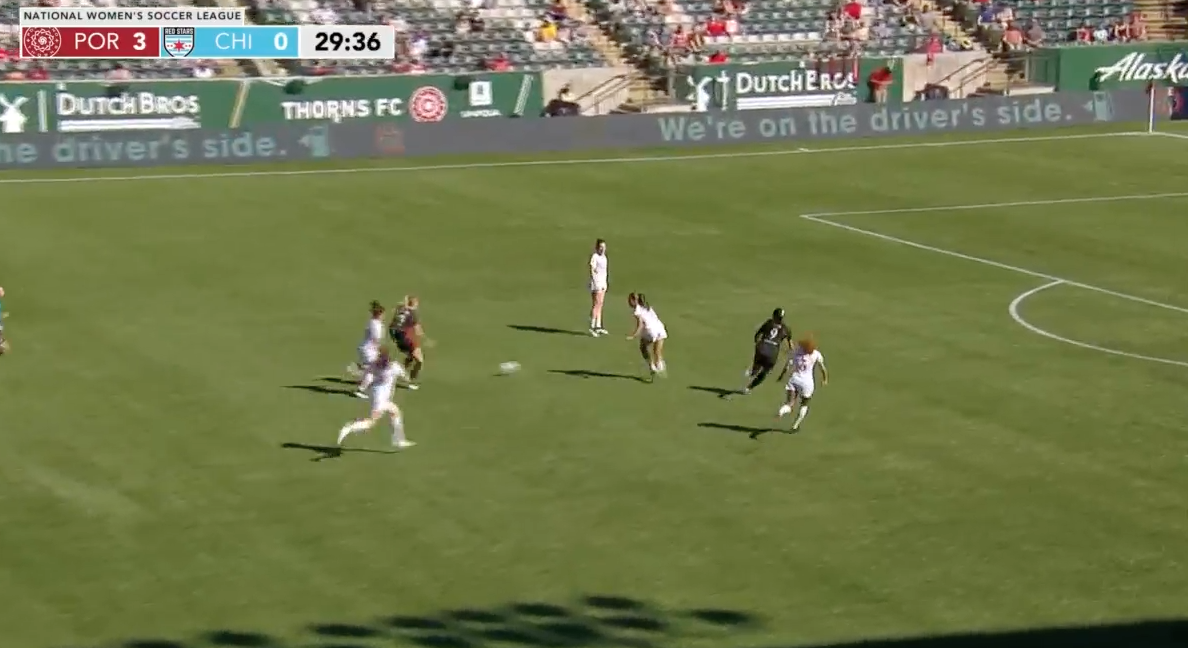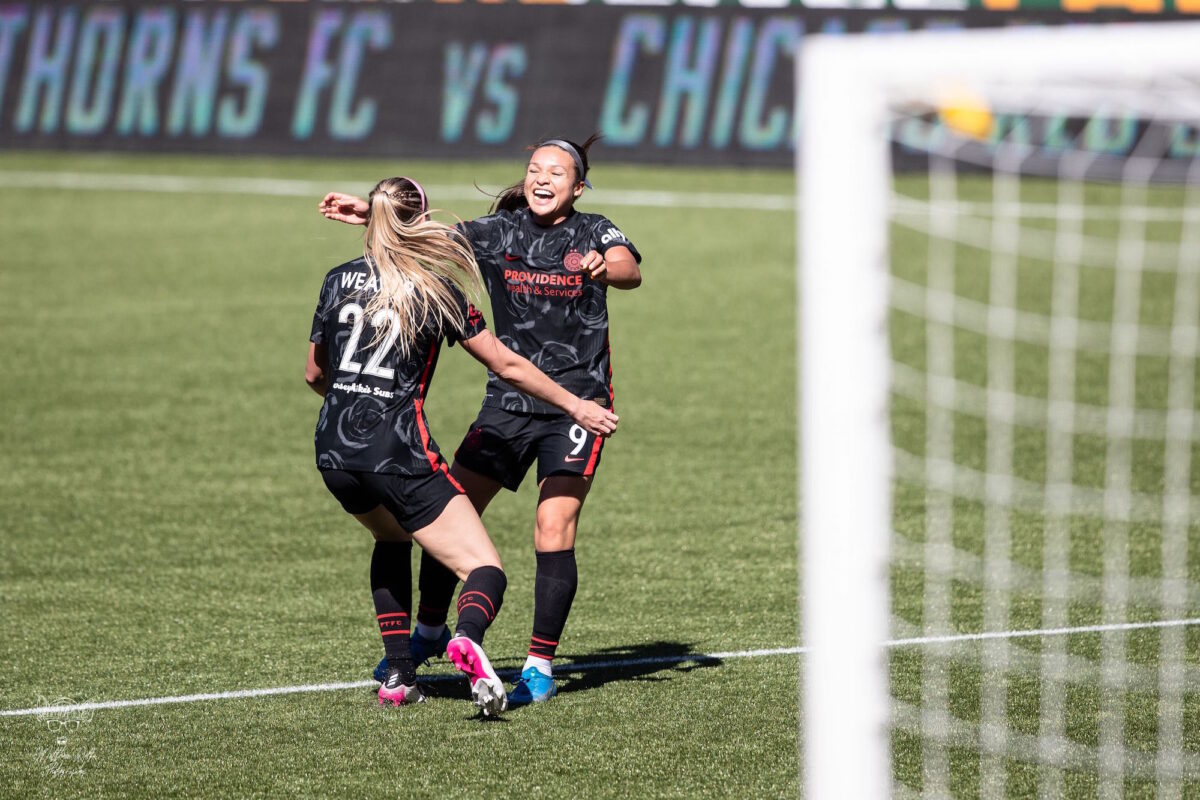The Thorns finally put it all together yesterday. In a 5–0 dismantling of the Red Stars, the moments of disconnect and bad luck that had kept Portland from dominating throughout the Challenge Cup fell away, and the girls in (black and) red looked like the fully armed and operational battle station we’ve been waiting for.
Sophia Smith scored a brace, though I’d argue she scored two and a half, as it was her powerful shot that deflected into the net off Tierna Davidson. A Christine Sinclair penalty and a right-place, right-time finish by Tyler Lussi—who pounced when Alyssa Naeher fumbled a save—closed out the scoring.
Read on for some of my takeaways from the weekend:
1. Reversion (progression?) to the mean
This was clearly Portland’s best performance to date, but it didn’t represent a huge leap in quality as much as it did all the pieces finally falling into place. We all knew the Thorns were good; that they hadn’t been this good before Sunday really does look like a combination of bad luck and insufficient time training as a full squad. These goals were always coming. It was only a question of which unlucky opponent they’d get unloaded on.
To review some numbers: the Thorns posted more than 20 shots in two of their five Challenge Cup games, including 26 in the final and 29, a club record, against the Reign. They ended Sunday’s game with 22, including 10 on target and 18 from inside the box.
Look at the xG for the 1–1 Challenge Cup final and the 5–0 regular season opener, and you may notice some similarities:
xG Race Chart for @ThornsFC v. @GothamFC!
— Arielle Dror (@arielle_dror) May 8, 2021
Despite the much better (and plentiful) chances in regulation, it took PKs for the Thorns to seal their first Challenge Cup victory. #BAONPDX #GothamFC #PORvNJNY #CC21 pic.twitter.com/mdklLzpiGb
xG Race Plot for @ThornsFC v. @chicagoredstars!#BAONPDX #MKOT #PORvCHI #NWSL pic.twitter.com/h7N8PkIlTf
— Arielle Dror (@arielle_dror) May 17, 2021
A lot of the chances that went wasted against Tacoma and Gotham came down to bad luck—Sophia Smith, in particular, looked totally snakebit last weekend—but yesterday, the team also solved a lot of the little miscommunications and disconnects that have shown up in previous games.
“We got everyone up to speed,” said Mark Parsons after the game. “What we saw today happened just before the FIFA [international] players broke off. We were playing like this for a couple weeks. Everyone returned, and what are we on now? Week three, week four? Around the same time the understanding became, rather than people thinking about what we need to do, it’s more subconscious and they’re just doing and having fun.”
2. The midfield had plenty of time and space
The Red Stars changed things up for Sunday and lined up in a 4-3-3, I assume because they were short a midfielder with Morgan Gautrat unavailable. This proved to be a mistake.
To start with, there’s an obvious numerical imbalance in the midfield, with Portland lining up in their usual diamond shape: Chicago’s No. 10, Vanessa DiBernardo, was largely tasked with marking Rocky Rodríguez, while Danielle Colaprico and Julie Ertz rotated between Christine Sinclair, Lindsey Horan, and Crystal Dunn. (When you put it like that, it doesn’t sound good for the Red Stars, does it?) Chicago’s wingers would sometimes help with Portland’s No. 8s, but since they were also responsible for Christen Westphal and Meghan Klingenberg, that always left either Dunn or Horan unmarked.
Still, with a sufficiently organized press, all that can be okay. Except the Red Stars’ press was not organized. This is just before Kling drew the penalty that led to Portland’s second goal:

The defensive disorganization is obvious: Dunn looks to have at least four passes available at this moment. Just before this, Ertz did succeed in forcing Rocky to pass backwards. On the other hand, DiBernardo has gotten lost, caught in the open because she wasn’t sure whether to press the back line or cut off a passing lane, and Colaprico has been caught ball-chasing and left Sinc open. In other words, not only are the Red Stars outnumbered in the center of the field, they aren’t effective in using the numbers they do have.
Making matters even worse, the mismatch wasn’t just numerical, but personnel-related, at many positions. Rocky turned DiBernardo a number of times, Christen Westphal handled Kealia Watt with ease, and Smith and Morgan Weaver stretched Chicago’s back line like taffy.
3. Portland shredded the Red Stars in transition
Speaking of which, two goals yesterday—and a handful of good chances—came from quick attacks in transition, either off counterattacks originating in the Thorns’ defensive third or from fast restarts by AD Franch. Smith and Weaver looked unstoppable, with Weaver sprinting at the back line to receive a long pass and Smith making the second run behind her. Franch’s distribution, not just fast but pinpoint accurate, is also to be lauded here.
This was another area where Chicago’s disorganization, and eventually (understandably!), a palpable sense of defeat, undid them. In the sequence leading to Smith’s second goal, three of the Red Stars’ defenders are sprinting shoulder-to-shoulder toward their goal after her. Then Arin Wright tries to hold Smith offside in what looks like a spur-of-the-moment decision—and ironically, Wright is herself the one keeping Smith onside, albeit just barely:

It’s a small moment, but it feels emblematic of how far out of step Chicago was throughout the game.
In short, we shouldn’t expect Portland to be this dominant in every game—but we did get a good look at the tools that are available when the squad is at full strength.

